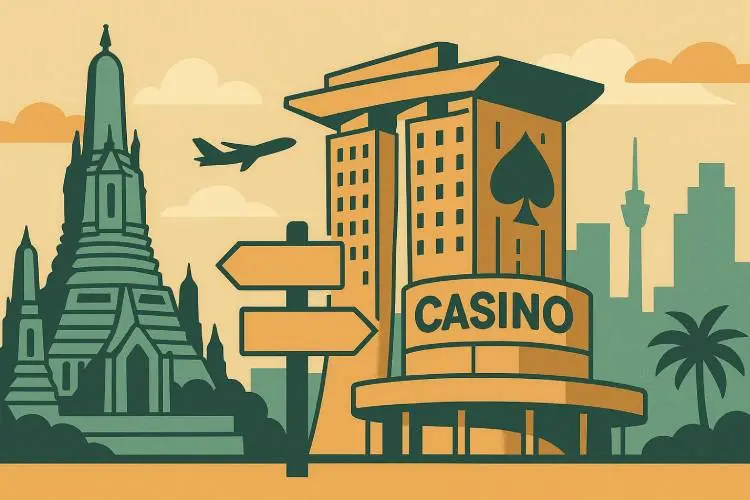Thailand Eyes Singapore Model for Casino Legalization


Thailand plans to legalize casinos as part of large-scale entertainment complexes, drawing inspiration from Singapore’s successful model. The goal is to boost tourism, generate jobs, and attract more investment while tightly regulating gambling.
Prime Minister Paetongtarn Shinawatra confirmed the initiative, noting it’s designed to combat illegal gambling, including online gambling sites, and strengthen Thailand’s position in Southeast Asia’s growing gaming industry.
Betting on Tourism to Revive the Economy
Tourism is a key pillar of the Thai economy. While 2024 saw 35.6 million visitors and 1.67 trillion baht (approx. $51 billion) in revenue, numbers still trail pre-pandemic highs. Officials believe integrated resorts, combining casinos, hotels, entertainment venues, and family attractions, can help close that gap.
Deputy Finance Minister Julapun Amornvivat said the proposed Entertainment Complex Bill could jumpstart the economy. Forecasts suggest these complexes could draw 100 billion baht in investment per resort and create as many as 20,000 jobs. Annual gross gaming revenue could exceed $9 billion.
Singapore as the Blueprint
The Thai government is looking to replicate the success of Singapore’s integrated resorts, specifically Marina Bay Sands and Resorts World Sentosa, which have helped transform Singapore’s tourism landscape since 2010.
Thailand will likely adopt strict controls similar to Singapore's to manage social risks. That could include background checks, an entry fee, and steep financial thresholds to ensure gambling is limited to wealthier individuals. Early drafts of the legislation propose a 50 million baht ($1.4 million) deposit requirement for locals to enter casinos.
The hope is that strict regulation will allow economic benefits while minimizing gambling addiction and crime.
Divided Public Opinion
Not all Thais are on board. While some support the proposal to control underground gambling and raise tax revenue, others see it as a threat to national values and public safety.
Former Prime Minister Thaksin Shinawatra, father of the current PM, has long supported legalized gambling as part of a broader economic strategy. But a recent poll showed that 59% of Thais oppose casino legalization, citing concerns about addiction, corruption, and the influence of foreign operators.
Critics argue that steep entry requirements may push everyday Thais toward illegal gambling dens, undermining the bill’s intent.
Political Hurdles Ahead
The proposal has already stirred political tension. Within the ruling coalition, the Bhumjaithai Party has expressed hesitation. Protests erupted earlier this year when the bill was fast-tracked through cabinet approval. With parliamentary debate postponed until July, legalization may not happen until 2026.
Opposition parties have seized on the issue, warning that casinos could benefit only wealthy investors at the expense of regular citizens. Although Prime Minister Shinawatra survived a no-confidence vote in March, the casino debate remains a flashpoint that could destabilize her government.
Final Thoughts: A Risky Bet
Thailand’s ambitious proposal to legalize casinos draws lessons from a proven model in Singapore. If implemented well, it could transform the tourism sector, bring in billions, and create thousands of jobs. But the road ahead is uncertain, given strong public skepticism, political divisions, and cultural sensitivities. For now, it remains a bold move, one that may or may not pay off.
Was this article helpful?
